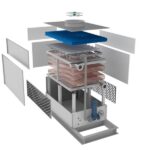Nozzles
Nozzles in cooling towers are devices designed to distribute water evenly over the fill material inside the tower. They play a critical role in facilitating efficient heat transfer by ensuring uniform wetting of the fill surface. This process maximizes the contact area between water and air, optimizing the tower’s cooling capacity. Nozzles can vary in design and function, including gravity spray, rotary, fixed spray, fan spray, and specialized high-efficiency types, each tailored to specific cooling tower applications and efficiency goals.
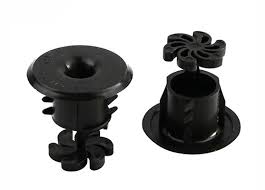
Nozzles in Cooling Tower
Advantages of
- Efficient Heat Transfer: Ensures uniform distribution of water over the fill material, maximizing the surface area contact between water and air for effective heat dissipation.
- Improved Cooling Efficiency: Enhances the overall efficiency of the cooling tower by optimizing water distribution and promoting consistent cooling performance.
- Energy Savings: Reduces energy consumption by optimizing heat transfer processes, resulting in lower operational costs.
- Reduced Water Usage: Helps minimize water wastage by distributing water evenly, ensuring effective cooling with minimal water consumption.
- Enhanced System Reliability: Prevents dry spots and uneven water distribution, which can extend the lifespan of cooling tower components and reduce maintenance requirements.
- Compliance and Safety: Ensures compliance with environmental regulations and safety standards related to cooling tower operation.
Nozzles in Cooling Tower
Types and Uses of
- Gravity Spray Nozzle: These rely on gravity to distribute water evenly over the fill material, suitable for smaller cooling towers.
- Rotary Nozzle: These rotate or oscillate to cover a larger area with water, ensuring uniform wetting of the fill material in larger cooling towers.
- Fixed Spray Nozzle: Stationary nozzles that emit a consistent spray pattern over the fill material, commonly used in various sizes of cooling towers.
- Fan Spray Nozzle: These create a fan-shaped spray pattern for uniform water distribution across the fill, enhancing cooling efficiency.
- High-Efficiency Nozzle: Designed to minimize water drift and achieve maximum distribution efficiency, reducing water consumption and operational costs.
- Variable Orifice Nozzle: Nozzles with adjustable flow rates to optimize water distribution based on cooling requirements and operational conditions.
Other Cooling Tower Spares We Manufacture
Honeycomb PVC Fills
Honeycomb PVC Fills are a type of fill media used in cooling towers, made from polyvinyl chloride (PVC). They feature a honeycomb-like structure that maximizes the surface area
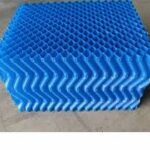
Drift Eliminators
Drift Eliminators are essential components in cooling towers designed to minimize the loss of water droplets, known as drift, that are carried out of the tower by the exiting airflow.
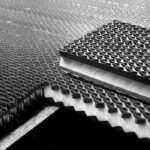
Axial Fan
Axial Fan is a type of fan that moves air along the axis of its blades. It typically consists of a motor and blades mounted on a shaft within a cylindrical housing. Axial fans are designed

Motors
Motors are specially designed electric motors used to drive fans in cooling towers. They are typically robust and corrosion-resistant, often made of materials like stainless steel

FRP Casing
FRP Casing refers to casings or enclosures made from Fiberglass Reinforced Plastic (FRP). FRP is a composite material consisting of a polymer matrix reinforced with fiberglass fibers.

Distribution Pipes
Distribution Pipes are essential components of infrastructure systems used to convey fluids from a central source to multiple endpoints for consumption or use.
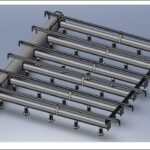
Sprinkler
Sprinkler in cooling towers are mechanical devices designed to evenly distribute water over the fill media inside the tower. They play a crucial role in the cooling process

Gearbox
Gearbox in a cooling tower is a mechanical component that serves to transmit and control the rotational speed and torque of the fan or other moving parts within the tower.
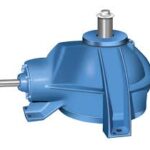
Structure and Hardware
Structure and Hardware of a cooling tower encompass its physical framework and essential components designed to facilitate heat dissipation.
